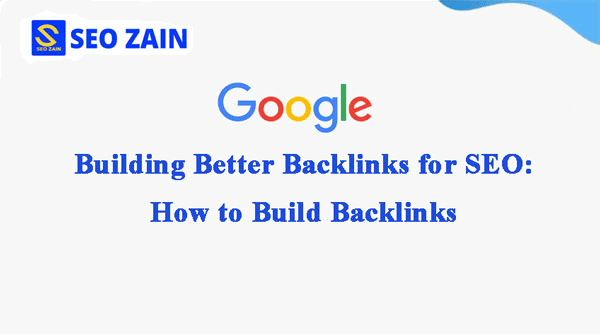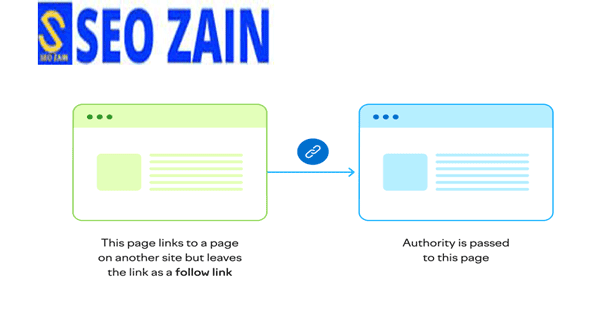There are a number of things you can do, and in this post, we'll share a strategy for building better backlinks for SEO. Follow this strategy and you'll be on your way to improving your website's ranking and increasing traffic to your site.
How to build better backlinks?
Link building is the practice of getting links back to your website from other websites. In SEO, these links are called backlinks. Getting backlinks from high-quality sites can pass the authority to your site, as well as help you rank higher on search engine result pages (SERPs).
According to Google, an important part of determining which pages are relevant and trustworthy is "understanding whether other notable websites link to or refer to content".
For this reason, it is important to consider link building when building your SEO strategy.
How Does Link Building Work?
The best way to boost your authority through link building is to earn backlinks from reliable and high-quality websites. If you have a large number of backlinks but they are from spammy and irrelevant sites, it probably won't help you rank better.
There are many ways to get backlinks, including:
- Guest blogging
- Promote on social media
- Manual communication
- Follow the backlinks of competitors
But keep in mind that backlinks are not everything - first of all, you should focus on creating useful and high-quality content.
When looking for ways to improve your rank, harnessing the power of link building can be a challenge for beginners and experienced professionals alike. However, it can be one of your most powerful tools for achieving organic success.
Link Building Strategy
Link-building strategies refer to the methods marketers and SEOs use to get other websites to link back to their own.
You could publish a blog post about camping safety measures, for instance, if you run a website that offers camping equipment. Other websites that discuss security issues may then link to your blog post so their users can find more information about it.
To attract other websites to link to your website, you can utilize a variety of link-building techniques:
- Content creation and promotion - Create compelling, unique, and high-quality content that people will naturally want to come back to, link to and tell people about. Spread the word before you expect anyone to find and link to your content!
- Reviews and Mentions - Put your product, service, or site in front of influencers in your industry, such as popular bloggers or people with a large social media following.
- Links from partners and friends - Request friends and people you work with to link to your site. Remember that importance is important; Links from sites in the same public domain or niche as your site will have more value than links from random, unrelated sites.
Why is Link Building Important for SEO?
Link building is an important component of SEO services because it assists search engines in discovering new web pages and determining which pages should rank higher in search engine results pages (SERPs).
This means, when using link-building strategies, your focus should be on earning links because you've created great content that users want to share - not just link building for search engines.
Link building is one of the most important ranking factors in Google, along with:
- On-page SEO and content optimization
- Trust and authority of the website
- Website loading speed
- Mobile compatibility
- User experience elements
What Are Types of Links
When planning a link-building strategy, it is important to know the different types of links.
Here are the most important types of links to know.
1. Nofollow vs. Follow
Nofollow links are usually used when you want to link to another website but don't want to ask Google to crawl that site.
To set a link as a nofollow link, you will need to add the rel="nofollow" attribute to the link code. Nofollow links will notify Google that the link should not pass PageRank.
The nofollow link is useful for two reasons:
- When you need to link to a site but don't want to authenticate it
- When the link is profitable. Google introduced rel="sponsorship" (and rel="ugc") as an additional type of backlink attribute, and prefers users to use rel="sponsorship" for paid or profitable links (such as paid ads, banner ads, affiliate links, and sponsored links) instead of rel="nofollow".
Keep in mind that nofollow links don't go through directly. However, they can still provide you with brand recognition and referral visits.
On the other hand, follow links are regular links with attributes that will tell Google that the link should pass the PageRank.
You can use the following link if you like:
- Transfer power to a trusted site
- Help search engine bots understand the content of the content
2. Links from Users
Using user-generated links as a link-building technique is not the ideal path when you are looking for your SEO strategy. In the past, Google punished those who attempted to link by the user.
You sometimes create user-generated links with the intent of promoting your own business. It is also generally of lower quality than other link building methods favored by Google.
Some examples of links from users include:
- Unmoderated blog comments
- Graphics and widgets included
- Users' profile pages
- Press releases or guest post signatures with greatly improved anchor text
- advertisements
Links from these sources won't harm your site, but it's generally not a good idea to spend some time on this strategy because these types of links probably won't pass any power.
3. Natural Links From Other Blogs or Websites
Natural links occur more naturally from readers who come across your website including a link on their blog or website without being asked. With this link type, don't ask webmasters or other users to give you a backlink.
Most natural links do not live in sponsored or paid content, nor do they have tracking parameters. They are usually added to the content of another blogger or webmaster with the intent of providing value to their readers.
This means that you are more likely to see natural links in videos, blog posts, photos, and other product listings on someone's website.
Having a natural link to your website is by all means considered a "good link" and has been called one of the safest link-building techniques. Natural links are also one of the best and most effective ways to promote your blog or website.
How To Build Better Backlinks For SEO?
Backlink building is one of the most significant pieces of SEO. They are links from websites that are related to your site. When someone clicks on a backlink, your site will show up in their search results.
There is no one-size-fits-all answer when it comes to link-building strategy. The best approach depends on the competitive landscape, the resources available, and the goals of the campaign.
However, there are some general principles that can be followed to create an effective link-building strategy.
1. Research the competition
The first step is to research the competition. This will give you an idea of the types of links they are building and the strategies they are using.
2. Identify link opportunities
The next step is to identify link opportunities. This can be done by using a tool like Ahrefs or Majestic.
3. Creating Great Content
If you want to rank your website higher in the search engine results pages (SERPs), you need to build backlinks. But before you can start building links, you need to create great content.
Why? Because Google and other search engines give higher rankings to websites that publish great content. So if you want to get those top spots, you need to have amazing content that people will want to link to.
4. Research Your Link Prospects
One of the most important aspects of link building is finding quality link prospects. These are websites that are likely to link to your content because they share your target audience, have a similar tone, or are in the same industry.
You can find potential link prospects by doing some research. Use Google search operators to find websites that are relevant to your topic. For example, if you're a wedding photographer, you could use the following search query: "wedding photography"
This will give you a list of websites that have published articles about wedding photography. You can then reach out to these websites and ask if they would be interested in linking to your content.
5. Build Relationships Before Asking for a Link
One of the best tips for getting links is to build relationships with other webmasters and site owners before asking for a link. If you can develop a relationship of trust, they may be more likely to link to your site.
You can start by exchanging links, commenting on each other's blogs, or even socializing on Twitter or Facebook. The more you get to know the other person, the better chance you have of getting a link from them.
6. Make Sure Your Links Are High-Quality
One of the most important factors when it comes to link building for SEO is making sure your links are high-quality. This means finding sites that are relevant to your niche, have high Domain Authority, and are not affiliated with spammy or blacklisted domains.
When building links, try to focus on quality over quantity. A few high-quality links will do more for your SEO than dozens of low-quality ones. And always be sure to read the terms and conditions of any site before you start building links, as some may require you to follow certain guidelines or rules.
7. Diversify Your Link Sources
One of the best ways to improve your SEO is to diversify your link sources. Instead of relying on a single website or blog to link to your site, try reaching out to a variety of different sources. This will help you appear more credible to search engines, and it will also help you build a stronger backlink profile.
When looking for potential link partners, try to find websites that are within your niche or that have a similar audience. You can also target high-traffic websites that are likely to generate a lot of traffic for your site. However, be careful not to partner with any website that you don't trust, as this could damage your SEO efforts in the long run.
Conclusion
Building better backlinks for SEO is one of the most significant ranking factors for SEO. Not only do they help to boost your site's authority, but they can also help to improve your organic search traffic.
However, not all backlinks are created equal. If you want to get the most out of your SEO efforts, you need to focus on building quality backlinks.




